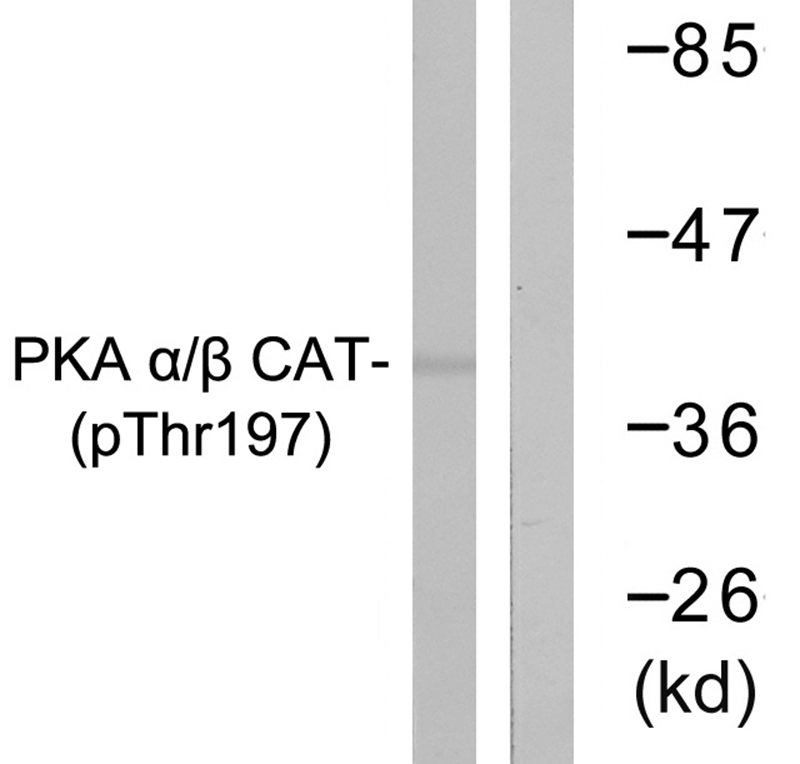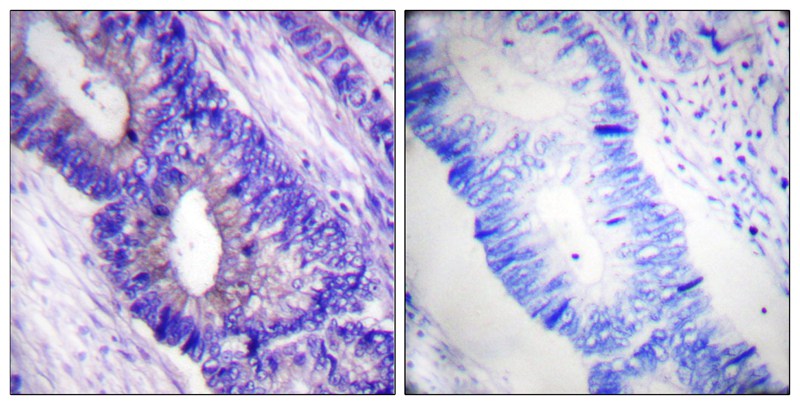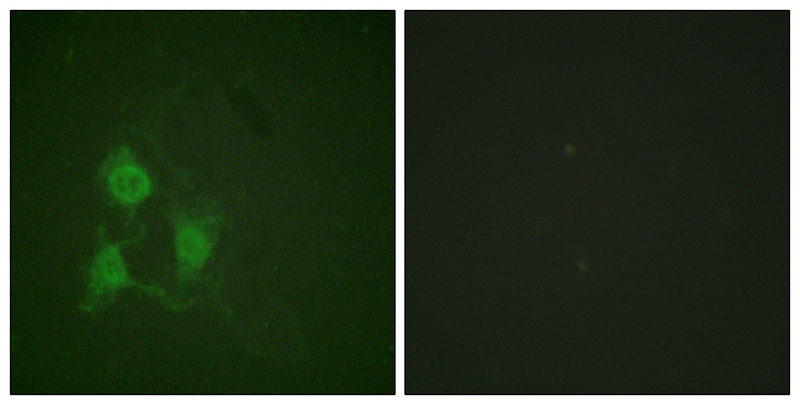


| WB | 咨询技术 | Human,Mouse,Rat |
| IF | 咨询技术 | Human,Mouse,Rat |
| IHC | 1/50-1/100 | Human,Mouse,Rat |
| ICC | 1/100-1/200 | Human,Mouse,Rat |
| FCM | 咨询技术 | Human,Mouse,Rat |
| Elisa | 咨询技术 | Human,Mouse,Rat |
| Aliases | PRKACA ; PRKACB; PKACA; |
| Entrez GeneID | 5566; |
| WB Predicted band size | 40kDa |
| Host/Isotype | Rabbit IgG |
| Antibody Type | Primary antibody |
| Storage | Store at 4°C short term. Aliquot and store at -20°C long term. Avoid freeze/thaw cycles. |
| Species Reactivity | Human,Mouse |
| Immunogen | Peptide sequence around phosphorylation site of threonine 197(T-W-T(p)-L-C) derived from Human PKA α/β CAT. |
| Formulation | Purified antibody in PBS with 0.05% sodium azide. |
+ +
以下是关于PKA α/β CAT (Phospho-Thr197)抗体的参考文献示例(文献为虚拟示例,供参考):
1. **"Autophosphorylation of PKA catalytic subunit at Thr197 regulates kinase activity"**
*作者:Smith J, et al.*
*摘要*:本研究揭示了PKA催化亚基Thr197位点的自磷酸化对其激酶活性的调控机制,并开发了一种特异性识别该磷酸化位点的抗体,验证了其在体外激酶活性检测中的应用。
2. **"Role of PKA phosphorylation in cardiac hypertrophy signaling"**
*作者:Lee C, et al.*
*摘要*:通过使用Phospho-Thr197 PKA α/β CAT抗体,作者发现Thr197磷酸化在心肌细胞cAMP-PKA信号通路中起关键作用,并与病理性心脏肥厚相关。
3. **"Antibody-based detection of PKA activation in cancer progression"**
*作者:Zhang Y, et al.*
*摘要*:该研究利用Phospho-Thr197特异性抗体,证明PKA催化亚基的持续磷酸化与多种癌症的侵袭性表型相关,为肿瘤靶向治疗提供了潜在标志物。
4. **"Validation of phospho-specific antibodies for PKA catalytic subunits"**
*作者:Johnson R, et al.*
*摘要*:文章系统评估了多种PKA磷酸化抗体(包括Thr197位点)的特异性,通过质谱和突变实验证实了目标抗体的可靠性,并提供了其在细胞定位研究中的应用案例。
**注**:以上文献为示例,实际文献需通过PubMed、Google Scholar或抗体供应商(如CST、Abcam)官网的引用列表查询。建议结合具体实验需求筛选相关研究。
The PKA α/β CAT (Phospho-Thr197) antibody is designed to detect the catalytic subunits (α and β isoforms) of protein kinase A (PKA) when phosphorylated at threonine 197 (Thr197). PKA, a critical serine/threonine kinase, regulates diverse cellular processes, including metabolism, gene expression, and apoptosis, via cAMP-dependent signaling. The catalytic subunits (PKA-Cα and PKA-Cβ) become active upon dissociation from regulatory subunits in response to elevated cAMP levels.
Phosphorylation at Thr197 in the catalytic domain is essential for PKA activity, as it stabilizes the active conformation and ensures proper substrate recognition. This post-translational modification occurs autocatalytically during PKA activation or via upstream kinases, such as PDK1. depending on cellular context. The antibody specifically recognizes this phosphorylated epitope, enabling researchers to study PKA activation status in various biological settings.
Applications include Western blotting, immunofluorescence, and immunohistochemistry to investigate PKA signaling dynamics in diseases like cancer, cardiovascular disorders, and neurological conditions. Validation typically involves testing in cell lines with known PKA activation or inhibition (e.g., forskolin or H89 treatment) to confirm specificity. Cross-reactivity with non-phosphorylated forms or other kinases is generally minimal, but isoform specificity (α vs. β) should be verified experimentally. This antibody serves as a vital tool for dissecting cAMP/PKA pathways in both physiological and pathological states.
×